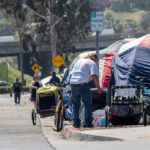CARLSBAD — Tax revenue is on track to match Fiscal Year 2019-20 levels thanks to a rebound in hotel and sales taxes, according to Roxanne Muhlmeister, the city’s assistant finance director.
Muhlmeister, along with Matt Sanford, the city’s economic development manager, discussed Carlsbad’s finances and economy during a third-quarter update at a May 17 council meeting. Muhlmeister said the rebound is thanks to re-openings in several sectors, such as hospitality and tourism, as the transient occupancy tax (hotel) has increased 161% compared to last year.
In addition, staff said revenue is estimated to come in $25 million higher than anticipated for the fiscal year due to a significant increase in property and hotel taxes. However, Deputy City Manager Laura Rocha tempered expectations, noting the city is still projecting General Fund expenditures to exceed revenues in the next several years.
“Our trend line is about where we thought it would be,” said Councilman Peder Norby. “We hear deficit spending and … includes all of the hires from last year. This is an incredibly healthy city.”
But comparing the current fiscal year to last year is difficult because of the shutdowns and restrictions on certain industries, according to Rocha. A number of factors are still in play related to the city’s budget and a more detailed look will be presented in the Fiscal Year 2022-23 preliminary budget at the council’s May 24 meeting.
Rocha said one reason for the good news regarding the city’s financial status is related to a “very conservative” staff when it comes to managing municipal finances. On April 20, the council held a workshop to review the budget, deficit projections by FY 2025-26 and new potential revenue streams.
Sales tax (up 29%) and business license revenues have both increased from last year, while expenditures have remained steady and as projected, Muhlmeister said.
“When we did the budget last year, we were still in a delicate state,” Muhlmeister said.
Muhlmeister said personnel costs are higher due to CalPERS pension obligations along with at least 20 new positions. Also, transfers to capital improvement projects and technology investment fund included a deposit of $11 million and $8 million for the General Construction Fund.
Also, Muhlmeister said the city saw increases in revenues and expenditures for both water and wastewater, while The Crossings had a net income of $830,000 — which was higher than last year despite the number of rounds played dropping slightly to 57,900 — with increases in food and beverage sales.
Councilwoman Teresa Acosta asked if the golf course can begin to pay back its outstanding debts. Muhlmeister responded by saying the matter warranted a deeper discussion.
“The golf course is covering its operating expenses and paying for ongoing capital improvements,” Muhlmeister said. “It’s a larger conversation for what they need for capital versus construction loan, which is not on our books, but we are tracking.”
As for the city’s economy, Sanford said while inflation is at its highest rate in 40 years, the city has recovered. The economy grew by $1 billion from 2020 to 2021 with unemployment at 3.1%, which is lower than the county average and just 0.2% above pre-pandemic levels.
He said prices are up 7.9%, supply chains are struggling and housing is likely to be impacted by rising interest rates from the Federal Reserve.
According to the staff report, the city’s gross regional product is $14.6 billion, which is the second-highest in the county behind the City of San Diego.



